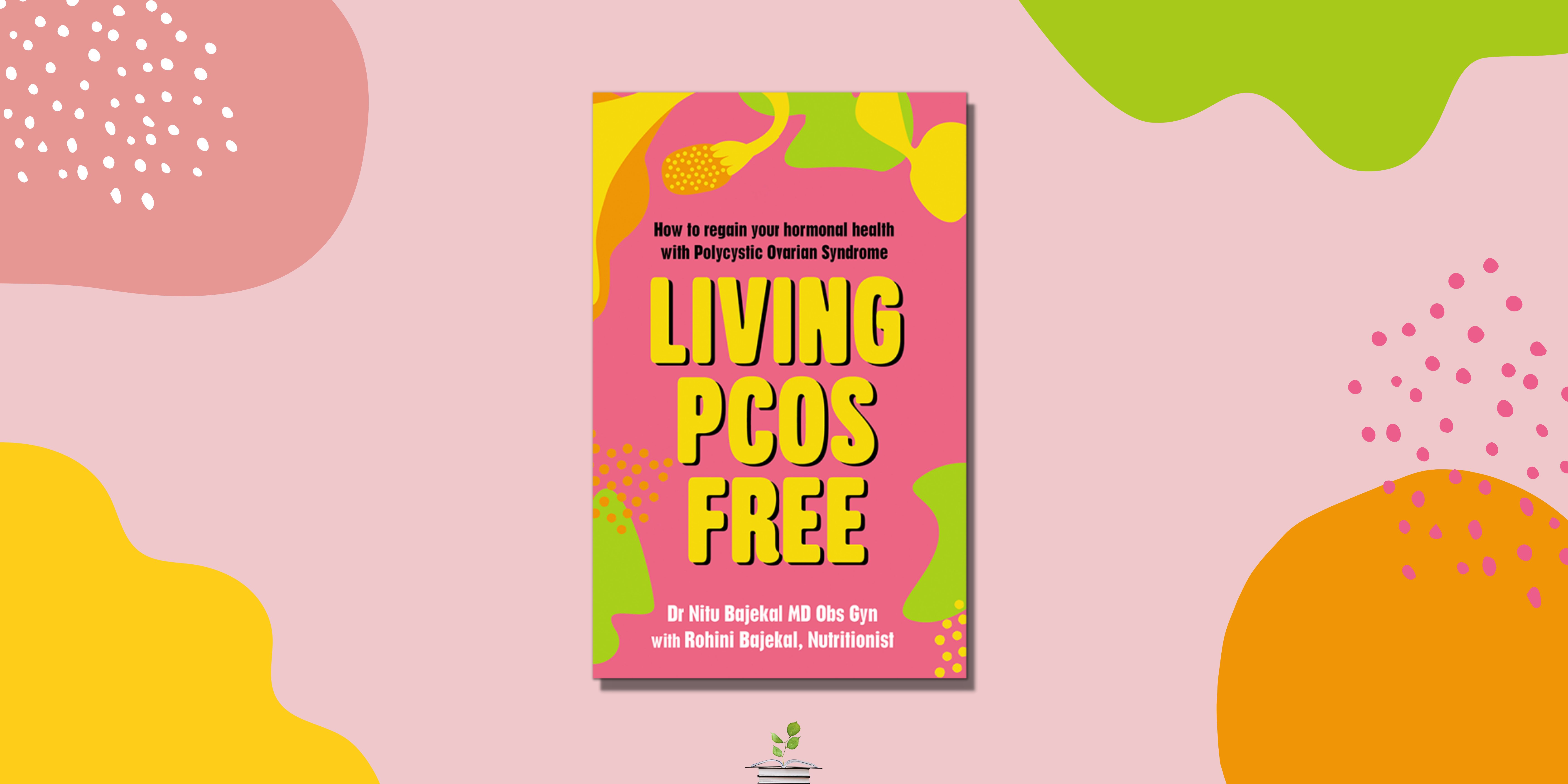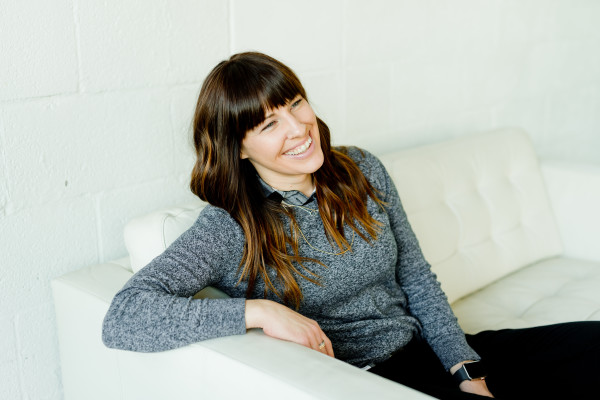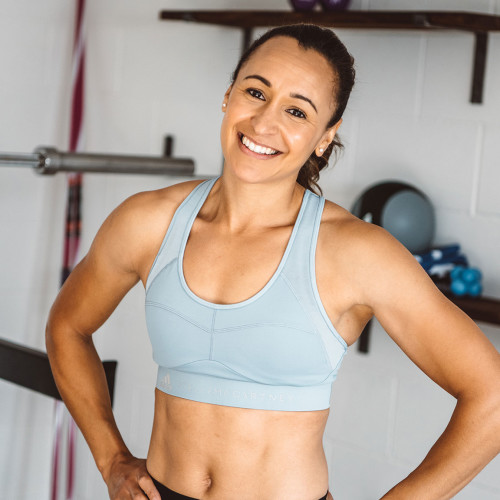What is polycystic ovary syndrome (PCOS) and what can I do to improve my symptoms?
10 months ago
Cycle syncing10 months ago
Cycle syncing
We chat to celebrated doctor and author, Dr Nitu Bajekal, about the proven lifestyle strategies that will help your PCOS symptoms...
“PCOS is the most common endocrine (hormonal) condition worldwide, affecting at least one in 10 women and those assigned female at birth (AFAB),” says Dr Nitu Bajekal , senior consultant gynaecologist and co-author of the excellent book, Living PCOS free . “But, three quarters of those with PCOS are never diagnosed.”
The good news is that if you know what to look for, you can get a PCOS diagnosis early, then start employing some proven lifestyle strategies, which will help you manage symptoms and your condition. Here, Dr Nitu, shares her words of wisdom…
The reasons for this are many fold and include:
The fact that symptoms often vary between individuals.
A lot of PCOS symptoms, such as missing periods, trouble losing weight and acne, are often wrongly attributed to our busy, stressful lives - meaning it can be tricky to diagnose.
There’s a social stigma that exists around some of the symptoms, such as excess facial and body hair, infertility and excess weight, which means people don’t speak as openly about PCOS as they should.
Added to that, “because you might see a different practitioner for each symptom – for example a gynaecologist for irregular periods, a dermatologist for the acne, a dietician for weight loss, a beautician for the facial hair, a therapist for acne, a fertility specialist for infertility – no-one ever joins the dots that all your symptoms are caused by one condition, and you’re often left in the dark,” explains Dr Nitu.
PCOS isn’t a disease of the ovaries, but a complex hormonal disorder that affects the function of the ovaries, causing metabolic, psychological and reproductive issues. Often, this means that women with PCOS do not ovulate regularly – and sometimes not at all.
The exact cause of PCOS is unknown, although it often runs in families and is more common in certain ethnic groups.
“When it comes to what’s happening hormonally, what we do know is that the main driver in 50-70% of women with PCOS appears to be insulin resistance,” reveals Dr Nitu.
To break this down, “the body’s tissues tend to become resistant to the action of insulin, a hormone produced by the pancreas to manage blood glucose levels,” explains Dr Nitu.
“As a result, we need more and more insulin to try and push blood glucose into our cells to be used as energy. This high level of insulin then stimulates the ovary to make more of certain sex hormones, known as androgens – testosterone being one example.”
You may experience some (but not necessarily all) of the following symptoms...
Delayed, irregular or no periods are the most common symptom of PCOS, experienced by 75-85% of women with PCOS, according to a study .
“Menstrual cycles normally fall between 24 and 35 days but with PCOS, you often have irregular cycles or longer cycles - from 38 to 45 days,” says Dr Nitu.
Why do we get missed or irregular periods?
The reason for this is that because your egg follicles don’t mature properly, you don’t release an egg every month. “This can lead to fertility problems if you’re trying for a baby, which is why it’s important to get a diagnosis and start managing it with lifestyle and medications as needed,” says Dr Nitu.
Polycystic ovary syndrome is badly named because you don’t actually get true ovarian cysts. “What actually happens is that your ovaries can get bigger and you develop lots of small, immature egg follicles arranged around the ovary in a line, just like a pearl necklace,” says Dr Nitu.
“Doctors call it a ‘string-of-pearls’ on an ultrasound.” There is no significant pain associated with these changes, so if you are experiencing painful periods, pelvic pain or painful sex, it is important to rule out conditions such as endometriosis, pelvic inflammatory disease or vaginismus as these can often coexist.”
Why do we get ovary changes?
This happens because your ovaries may overproduce testosterone, usually as a result of the high insulin levels and insulin resistance we mentioned earlier. “This halts the development of the egg follicles, which curbs their growth and means they don’t go on to release an egg. It's this that gives you an irregular menstrual cycle,” says Dr Nitu. Excess amounts of oestrogen, especially in our body fat, can also stop regular monthly ovulation.
Acne, usually on your chin, back or chest; excess facial and body hair on your back, chest and thighs; and thinning hair and hair loss from the top of your head can also be symptoms.
Why do we get these symptoms?
“In PCOS, your ovaries over-produce androgens such as testosterone, and that can trigger these symptoms,” says Dr Nitu. The adrenal glands located on top of the kidneys may also produce excess androgens in PCOS.
“This is common, with eight out of 10 people with PCOS putting on weight,” says Dr Nitu. “As many as 30% of women with obesity have PCOS. However, lean PCOS accounts for around 20% of people with the condition, where the body weight is in the so-called “healthy” range.”
Why do we put on weight?
Weight gain and difficulty losing weight is linked to insulin resistance. “Unfortunately, it’s a bit of a catch-22 situation, because having excess weight can make your insulin resistance worse, which can in turn aggravate your PCOS symptoms,” says Dr Nitu.
While the above are the main symptoms, there are lots of other less well-known but still common symptoms in PCOS:
Eating disorders, in particular binge-eating and bulimia nervosa - “Excess androgens can affect both your appetite and regulation of the stress hormone cortisol,” says Dr Nitu.
Sleep-breathing problems, for example sleep apnoea - if you’re overweight, you’re more likely to snore and have other sleep disturbances, such as sleep apnoea
Daytime sleepiness
Tiredness
Acanthosis nigricans - Where the skin in particular parts of the body gets a bit thicker and darker. “It’s a sign of insulin resistance,” says Dr Nitu.
Psychological problems, such as anxiety, depression, OCD and even higher rates of suicide
To be diagnosed with PCOS, your doctor needs to tick off two of the following three key symptoms - and, as we’ve mentioned above, connect the dots so that the symptoms aren’t treated in isolation.
Irregular or missed periods or no periods at all
A sign that you have too many androgens in your body. So one or more of the following: 1) Excess hair growth on the face and body; 2) Cystic, nodular or painful acne; 3) Thinning hair or hair loss
Blood tests that show signs of androgen excess
Ultrasound scan of your ovaries showing the tell-tale string of immature ovarian follicles and enlarged ovaries.
To diagnose adolescent PCOS, we use the first two criteria and don’t use an ultrasound scan. The reason for this is that teenagers often have multicystic ovaries that may look polycystic in nature, so it is not a reliable tool in this age group.
There is no cure for PCOS, but the good news is that some simple lifestyle tweaks can be really effective at helping you manage your PCOS symptoms. “Once you follow these lifestyle strategies, both insulin resistance and inflammation in the body improve,” says Dr Nitu. “We also know that if carrying excess weight, if you lose 5-7% of your body weight, your androgen levels reduce because body fat makes androgens as well as excess oestrogen.”
Sleeping badly when you have PCOS is linked to an increased risk of obesity, insulin resistance and depression, which can make your other symptoms worse, according to a study . “The goal is to feel rested when you wake up each morning,” says Dr Nitu. “For most people, that means aiming for 7-9 hours of sleep a night. Make sure you sleep in a cool room and get time to wind down before bed.”
“Find exercise that you enjoy and move your body for half an hour a day,” says Dr Nitu. “It doesn’t have to be a tough workout in the gym – you could go for a walk, dance, skip, do yoga, resistance training or a home workout. It doesn’t matter what you do as long as you move.
“Exercise will help you regulate your insulin and glucose levels, increase endorphins and make you feel better about yourself, which makes it easier to follow the other health goals. Ideally go for a 10 -15 minute brisk walk or exercise as soon as you finish eating.”
High levels of the stress hormone cortisol will increase feelings of anxiety, depression and can lead to trouble sleeping. “It’s a vicious cycle in PCOS,” says Dr Nitu. “If you haven’t slept properly, you’ll wake up feeling stressed and the stress and fatigue can lead to other symptoms such as anxiety and depression.
“Everyone gets stressed sometimes, so it's important is to learn what works for you,” says Dr Nitu. “For example, try breathing exercises, mindfulness, go for a walk with a friend, meditate or listen to music – whatever works for you.”
While you’re focusing on improving your PCOS, it’s best to steer clear of alcohol completely. “It can affect your sleep and your ability to manage stress, and it can exacerbate certain secondary symptoms of PCOS that affect your wellbeing, such as anxiety, depression, eating disorders, fatigue and daytime sleepiness,” says Dr Nitu.
5. Build a positive social network
Having a community of friends and family who you can turn to in good times and bad is really important, says Dr Nitu. “It’s important to have friends and family who care for you and make you feel good about yourself. It will boost feelings of wellbeing, which helps to reduce stress.”
“PCOS is an inflammatory condition, like heart disease, type 2 diabetes and dementia,” says Dr Nitu. “But the good news is that fibre reduces inflammation in the body. Because of this, aim to eat foods high in fibre, such as beans, lentils, soya, wholegrains, nuts, seeds, fruits and vegetables.
“Avoid foods that increase inflammation, such as ultra-processed foods, barbecued meats, refined grains, sugary foods and animal foods. These are often high in advanced glycation endproducts (AGEs) that damage tissues, including the ovaries.
“Once you have lowered the amount of inflammation in the body, you’ll reduce levels of your stress hormone cortisol – and this will help you better manage stress, sleep, anxiety and other PCOS symptoms which have a knock-on effect on your PCOS control.”
If opting for a more plant-based diet seems overwhelming at first, Dr Nitu suggests starting with one daily change at a time, for example just eating a new fruit every day for a week. “It’s fine to bring in one vegetable at a time, one fruit at a time,” she explains.
Taking a daily supplement of Vitamin D and Omega 3 can be really helpful in those with PCOS, with studies showing that Vitamin D is helpful for preventing insulin resistance, while Omega-3 fatty acids may reduce metabolic disorders such as insulin sensitivity, obesity and inflammation.
While some women can manage their PCOS just through lifestyle changes alone, others will still need medication and supplements, so it’s worth talking to your medical practitioner about what’s right for you.
Other great resources include the PCOS Awareness Association for more general advice and Angelique Panagos , nutritional therapist, for advice on eating well to support your PCOS diagnosis. It’s also well worth picking up Dr Nitu’s book, Living PCOS free , which was originally recommended to the Jennis editorial team by our in-house GP. A great read, packed with knowledge and full of actionable tips to help you take control of your condition.
Follow Dr Nitu Bajekal on Instagram
Get Dr Nitu Bajekal and Rohini Bajekal’s book ‘ Living PCOS free ’
 Cycle syncing
Cycle syncing Perimenopause
Perimenopause Perimenopause
Perimenopause Perimenopause
PerimenopauseSign up to learn everything you need to know about CycleMapping, plus how you can live better and feel better through optimising your fitness to you.
This website uses cookies to ensure you get the best experience on our website. Learn more

Sign up for the very latest news on women's fitness, health and hormones, plus be the first to receive exclusive offers and extras